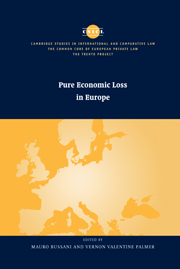Book contents
- Frontmatter
- Contents
- General editors' preface
- Preface
- List of contributors
- Table of legislation
- Relevant statutory and codified provisions (in translation)
- List of abbreviations
- Part I Situating the Frontier
- Part II The comparative evidence: case responses and editors' comparative comments
- 6 Preliminary remarks on methodology
- 7 The case studies
- Part III Much ado about something
- Bibliography
- Index
6 - Preliminary remarks on methodology
Published online by Cambridge University Press: 03 November 2009
- Frontmatter
- Contents
- General editors' preface
- Preface
- List of contributors
- Table of legislation
- Relevant statutory and codified provisions (in translation)
- List of abbreviations
- Part I Situating the Frontier
- Part II The comparative evidence: case responses and editors' comparative comments
- 6 Preliminary remarks on methodology
- 7 The case studies
- Part III Much ado about something
- Bibliography
- Index
Summary
Aim and method of the study
The general purpose of this study is to inquire to what extent, if any, there exists a common core of principles and rules concerning compensation for pure economic loss within European tort law.
Being a research branch of the ‘Common Core Project’, our study shares with the latter its basic aims and methodology. For this reason the collective inquiry has been carried out on the basis of a factual approach and the most important tool of the research has been a fact-based questionnaire. In 1995, at a general meeting of the Common Core Project in Trento, Italy, the editors worked with a group of tort scholars from various parts of Europe to devise a questionnaire consisting of twenty fact situations, each to be solved or answered under the laws, codes and doctrines of one country. A team of national reporters was then assembled and began work on the project. It was our intent that every country in the European Union would be covered; however, as it proved impossible to obtain reporters for Denmark, Luxembourg and Ireland, the current study covers eleven national systems plus England and Scotland.
To make clear how the general methodological framework of the project has been exploited and adapted to the needs of our research, we first discuss: (1) the advantages and efficiencies of the ‘Common Core’ approach; (2) the reasons for adopting a three-level response.
- Type
- Chapter
- Information
- Pure Economic Loss in Europe , pp. 163 - 170Publisher: Cambridge University PressPrint publication year: 2003



